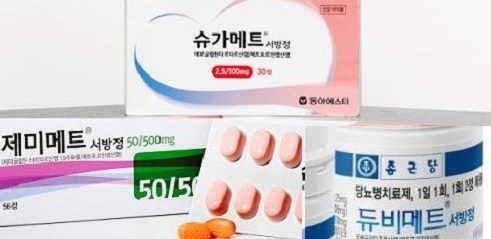Diabetes association urges authorities to test metformin drugs for cancer-causing contaminant
By Lim Jeong-yeoPublished : Dec. 15, 2019 - 17:29
Metformin, a drug used to treat Type 2 diabetes, was once heralded as a first-in-class treatment for which there was no substitute. Now it is sparking international concerns over a contaminant that may cause cancer.
The debate has taken off in South Korea as well, and on Friday the Korean Diabetes Association urged the nation’s drug safety authority to test every drug containing metformin.
The potentially carcinogenic impurity, called N-nitrosodimethylamine or NDMA, had previously been detected in valsartan, a blood pressure drug, and in peptic ulcer drugs ranitidine and nizatidine. This resulted in global recalls of the original drugs and numerous copy drugs.

The scare is now splashing over to metformin. The public has been concerned ever since Dec. 4, when Singapore’s Health Sciences Authority announced that it had recalled three metformin-based drugs with unacceptable levels of NDMA.
Acceptable levels of NDMA vary depending on the governing body, but most set limits around 9 to 10 nanograms per liter.
Small amounts of NDMA are found in everyday products such as bacon and other cured meats, as well as in beer, cheese, fish, shampoos and detergents.
Not all metformin drugs contain unacceptable levels of NDMA, and the Ministry of Food and Drug Safety here contends that individual drug manufacturers should test their products and report any abnormalities they discover.
NDMA is believed to form either during the drug manufacturing process or during storage.
There are over 640 metformin drugs in Korea, which makes it safe to say that every pharmaceutical company here offers at least one, according to the Korea Diabetes Association. Some 2.4 million diabetes patients here are believed to take metformin.
The association urged the Drug Safety Ministry to oversee the drug review process to assuage public fear, while at the same time stressing that patients must not stop taking their medication on their own, as this would cause a spike in their blood sugar levels.
By Lim Jeong-yeo (kaylalim@heraldcorp.com)
The debate has taken off in South Korea as well, and on Friday the Korean Diabetes Association urged the nation’s drug safety authority to test every drug containing metformin.
The potentially carcinogenic impurity, called N-nitrosodimethylamine or NDMA, had previously been detected in valsartan, a blood pressure drug, and in peptic ulcer drugs ranitidine and nizatidine. This resulted in global recalls of the original drugs and numerous copy drugs.

The scare is now splashing over to metformin. The public has been concerned ever since Dec. 4, when Singapore’s Health Sciences Authority announced that it had recalled three metformin-based drugs with unacceptable levels of NDMA.
Acceptable levels of NDMA vary depending on the governing body, but most set limits around 9 to 10 nanograms per liter.
Small amounts of NDMA are found in everyday products such as bacon and other cured meats, as well as in beer, cheese, fish, shampoos and detergents.
Not all metformin drugs contain unacceptable levels of NDMA, and the Ministry of Food and Drug Safety here contends that individual drug manufacturers should test their products and report any abnormalities they discover.
NDMA is believed to form either during the drug manufacturing process or during storage.
There are over 640 metformin drugs in Korea, which makes it safe to say that every pharmaceutical company here offers at least one, according to the Korea Diabetes Association. Some 2.4 million diabetes patients here are believed to take metformin.
The association urged the Drug Safety Ministry to oversee the drug review process to assuage public fear, while at the same time stressing that patients must not stop taking their medication on their own, as this would cause a spike in their blood sugar levels.
By Lim Jeong-yeo (kaylalim@heraldcorp.com)



![[Herald Interview] 'Amid aging population, Korea to invite more young professionals from overseas'](http://res.heraldm.com/phpwas/restmb_idxmake.php?idx=644&simg=/content/image/2024/04/24/20240424050844_0.jpg&u=20240424200058)












![[KH Explains] Korean shipbuilding stocks rally: Real growth or bubble?](http://res.heraldm.com/phpwas/restmb_idxmake.php?idx=652&simg=/content/image/2024/04/25/20240425050656_0.jpg&u=)

